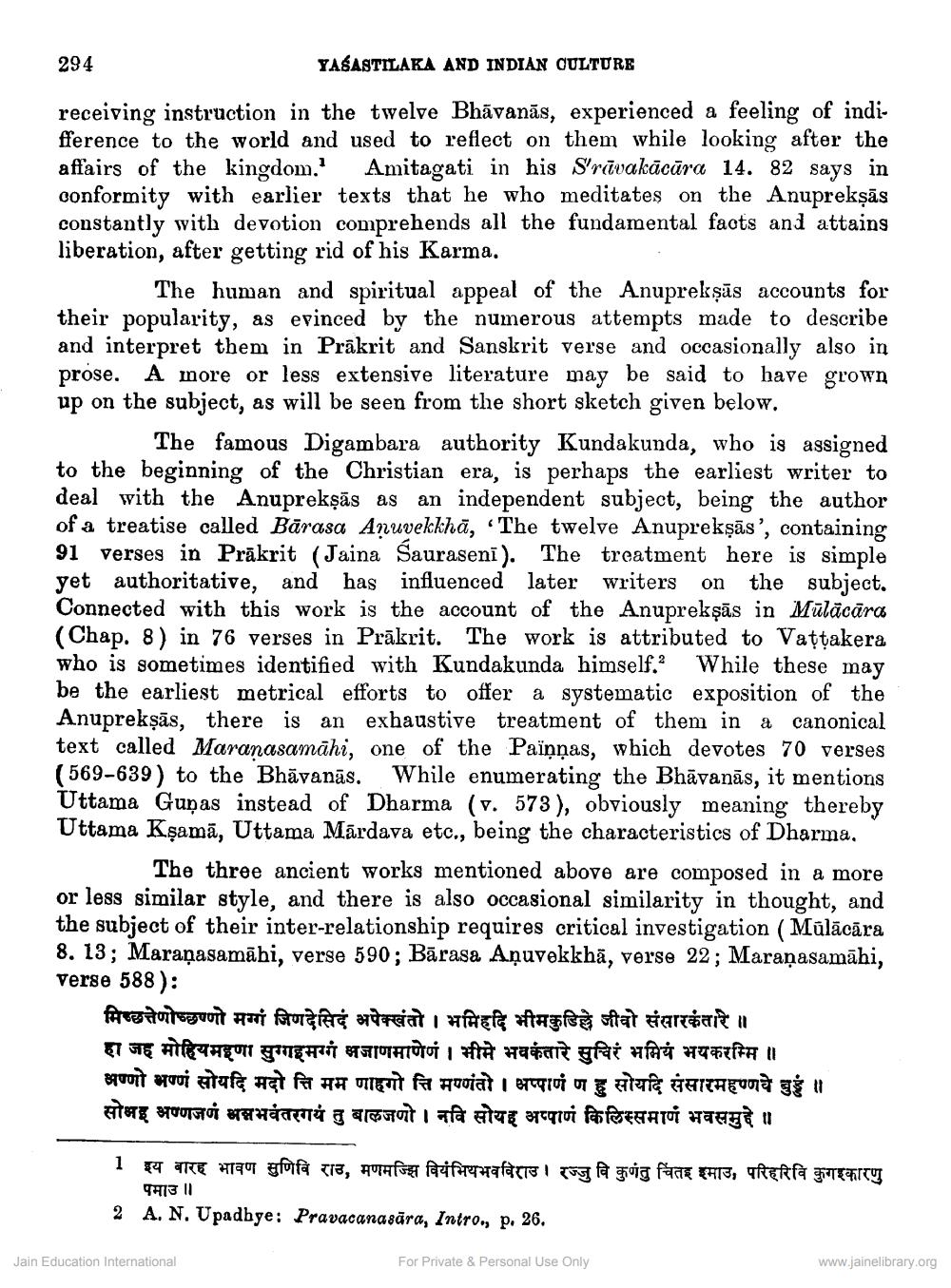________________
294
YASASTILAKA AND INDIAN CULTURE
receiving instruction in the twelve Bhāvanās, experienced a feeling of indifference to the world and used to reflect on them while looking after the affairs of the kingdom. Amitagati in his Srūvakācāra 14. 82 says in conformity with earlier texts that he who meditates on the Anupreksās constantly with devotion comprehends all the fundamental facts and attains liberation, after getting rid of his Karma.
The human and spiritual appeal of the Anuprekşās accounts for their popularity, as evinced by the numerous attempts made to describe and interpret them in Prakrit and Sanskrit verse and occasionally also in prose. A more or less extensive literature may be said to have grown up on the subject, as will be seen from the short sketch given below.
The famous Digambara authority Kundakunda, who is assigned to the beginning of the Christian era, is perhaps the earliest writer to deal with the Anupreksäs as an independent subject, being the author of a treatise called Bārasa Anuvekkhā, The twelve Anuprekşās', containing 91 verses in Prākrit (Jaina Sauraseni). The treatment here is simple yet authoritative, and has influenced later writers on the subject. Connected with this work is the account of the Anuprekşās in Mülācāra (Chap. 8) in 76 verses in Prākrit. The work is attributed to Vaţtakera who is sometimes identified with Kundakunda himself. While these may be the earliest metrical efforts to offer a systematic exposition of the Anuprekşās, there is an exhaustive treatment of them in a canonical text called Maranasamāhi, one of the Païņņas, which devotes 70 verses (569-639) to the Bhāvanās. While enumerating the Bhāvanās, it mentions Uttama Guņas instead of Dharma (v. 573), obviously meaning thereby Uttama Kşamā, Uttama Mārdava etc., being the characteristics of Dharma.
The three ancient works mentioned above are composed in a more or less similar style, and there is also occasional similarity in thought, and the subject of their inter-relationship requires critical investigation (Mülācāra 8. 13; Maraṇasamābi, verse 590; Bārasa Aņuvekkhā, verse 22; Maraṇasamāhi, verse 588):
मिच्छत्तेणोच्छण्णो मगं जिणदेसिदं अपेक्खंतो। भमिहदि भीमकुडिल्ले जीवो संसारकतारे ॥ हा जह मोहियमइणा सुग्गइमगं भजाणमाणेणं । भीमे भवकतारे सुचिरं भमियं भयकरम्मि ॥ अण्णो भण्णं सोयदि मदो ति मम णाहगो त्ति मण्णंतो । अप्पाणं ण हु सोयदि संसारमहण्णवे बु९ ॥ सोभइ अण्णजणं भमभवंतरगयं तु बालजणो । नवि सोयह अप्पाणं कि लिस्समाणं भवसमुहे ॥
1 इय बारह भावण सुणिवि राउ, मणमज्झि वियंभियभवविराउ । रज्जु वि कुणंतु चिंतइ इमाउ, परिहरिवि कुगइकारणु
971311 2 A. N. Upadhye: Pravacanasāra, Intro., p. 26.
Jain Education International
For Private & Personal Use Only
www.jainelibrary.org




